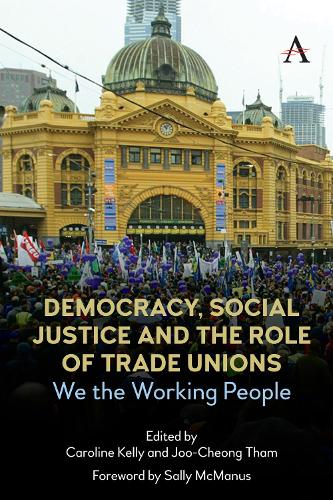
Democracy, Social Justice and the Role of Trade Unions: We the Working People
(Hardback)
Publishing Details
Democracy, Social Justice and the Role of Trade Unions: We the Working People
By (Author) Caroline Kelly
Edited by Joo-Cheong Tham
Anthem Press
Anthem Press
7th September 2021
United Kingdom
Classifications
Professional and Scholarly
Non Fiction
Industrial arbitration and negotiation
331.880994
Physical Properties
Hardback
234
Width 153mm, Height 229mm, Spine 26mm
454g
Description
Trade unions are central to Australian social, economic and political life. They are the largest voluntary organisations in the country, are a significant presence in political life, and, as workplace organisations, are often the only effective vehicle to give voice to working people. Their role is nevertheless under serious challenge with low and declining union density and shrinking coverage of collective bargaining. Controversies surrounding several union officials have also called into the question the legitimacy of trade unions. And for some governments, trade unions are not social partners but rather targets of restrictive legislation.
This book provides a critical assessment of Australian trade unions based on their democratic role as representatives of working people and their social justice role in providing, among other things, a countervailing force to employer power. Contributions by leading scholars tackle enduring themes such as economic democracy and the rule of law in the workplace, key developments in the labour market including precarious work, the gig economy, and labour migration. It also addresses topics that have not received adequate attention such as trade agreements, money in politics and, importantly, the question of how the democratic and social justice roles of trade unions interact with the challenge of climate change.
Reviews
In an era when democratic institutions are under great strain, this important volume brings together leading scholars to examine the central constitutional role of trade unions as guarantors of democracy and social justice. The chapters consider the multiple challenges presented by climate change, migration, the erosion of secure employment, the global pandemic, and international trade. The need for strong and democratic trade unions has never been so urgent. This book is a vital scholarly contribution to these debates. Alan Bogg, Professor of Labour Law, Bristol University, UK
After decades of being decimated by hostile and repressive politics, this important book considers whether trade unions can emerge once more to cement their place as a formidable democratic institution; to give workers a proper voice at work and on the political stage. I commend it to you. Josh Bornstein, Principal Lawyer, Maurice Blackburn Lawyers, Australia
This edited collection makes a significant and timely contribution to labour law and industrial relations, especially given the ongoing impact of the COVID-19 pandemic. It brings a strong scholarly focus to the often fraught role of trade unions as social partners, particularly in face of the fragmentation of employment relationships. A particular innovation is the attention paid to the democratising role of unions, both within nation states and transnationally. Sara Charlesworth, Professor of Gender, Work & Regulation, RMIT University, Australia
This collection of essays by eminent experts provides a timely analysis of the vital role that trade unions can, and must, play in meeting the existential challenges facing contemporary industrial democracies. It is essential reading for anyone concerned about the impact of disruptive technologies, climate change, and neoliberal ideology on labour markets. Joellen Riley Munton, Professor of Law, The University of Technology Sydney, Australia
This book provides a clear-sighted vision for the remedial role of trade unions and social democratic governance in an age of atomising and precarious work relationships and climate crisis. It is a 'must read' for labour policy-makers and trade union leaders alike. Dr Eugene Schofield-Georgeson, Senior Lecturer in Law, The University of Technology Sydney, Australia
Democracy, Social Justice and The Role of Trade Unions is a timely co-edited volume examining the democratic role of trade unions in the context of increasing precariousness in labour markets and capital mobility coupled with decline of worker representation in an era of pandemic capitalism. Advancing novel theoretical and empirical approaches and claims, contributors explore the role of trade unions in struggles for social justice in the form of decommodification of labour and economic democracy. Leah Vosko, Professor of Political Science and Canada Research Chair in The Political Economy of Gender & Work, York University, Canada
Author Bio
Joo-Cheong Tham is a professor at Melbourne Law School and director of the Electoral Regulation Research Network. His research areas are labour law and public law, with a focus on law and democracy and precarious work.
Caroline Kelly is a PhD candidate at the Melbourne Law School. Her research areas are labour law and public law, with a focus on the influence of administrative law doctrines in Australian labour law.
